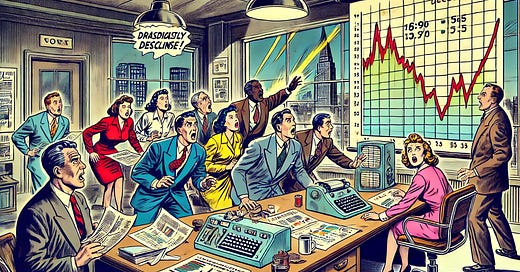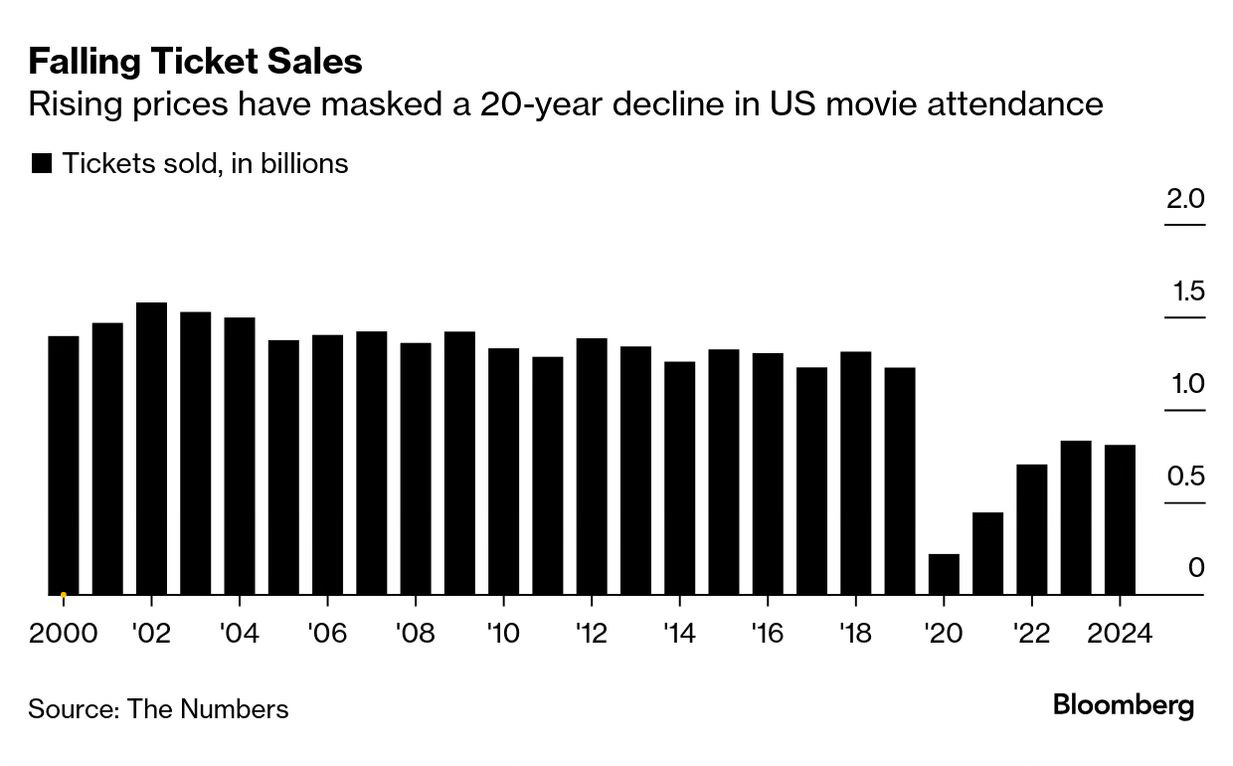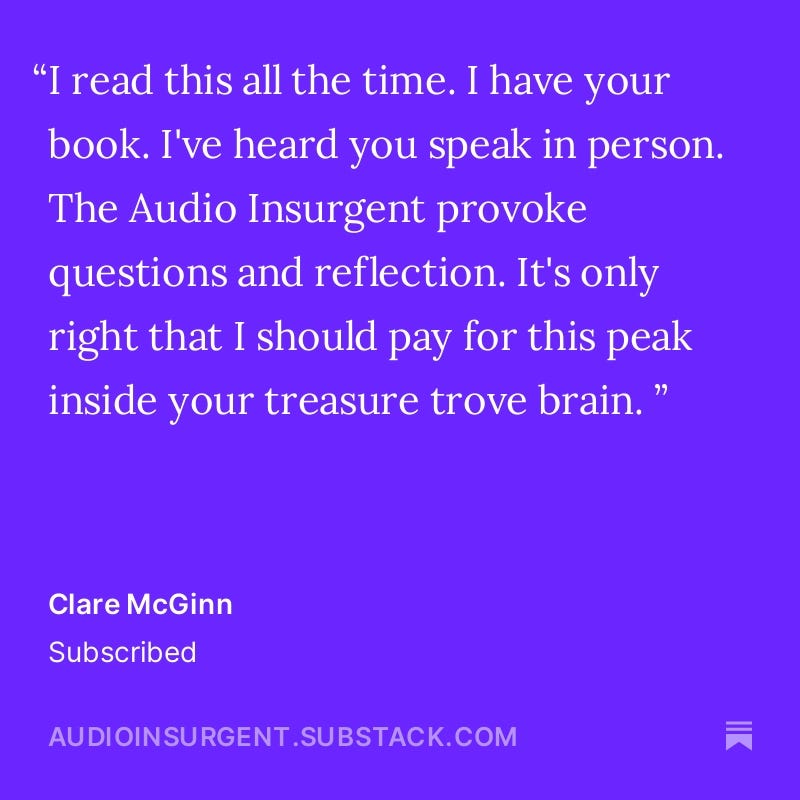The Future is Not Zero
Audio is in an age of constant disruption and reinvention–but that doesn’t mean any audio mediums are “dying,” just changing.
Welcome to Dispatch #73 of The Audio Insurgent.
Let’s jump right into it…
[TODAY’S MAIN THING: THE FUTURE IS NOT ZERO] I saw the chart below in a recent newsletter from Bloomberg and it has been stuck in my head ever since.
It is a really well-constructed chart, but if you aren’t interested in decoding, it shows the volume of movie tickets sold over the last 24 years. It is meant to illustrate that once you account for rising ticket prices, you see that Hollywood is selling about half the number of movie tickets it did a decade ago.
Now, at this point, you are either a “glass half empty” or “glass half full” kind of person. That may be a generous thing to say…as almost everyone is a “glass half empty” kind of person when it comes to cinema, or any other form of media and mainstream entertainment for that matter. To them, movie theaters are DYING. Just like television is DYING and Facebook is DYING and radio is DYING and narrative podcasting is DYING and music festivals are DYING. The truth is that none of these things are dying, they are just changing. And when you focus on the DYING part, you look past the parts that are alive…and often, surprisingly healthy and with plentiful opportunity.
And I think there is a huge lesson in this for radio and podcasting. More in a moment.
Be like Clare. Clare supports The Audio Insurgent with a paid subscription. You can do so for as little as $5 by clicking below. Encourage this incourageableness.
And even better, you would have received this dispatch days ago if you were a paid subscriber.
Thank you!
So let’s jump back to cinemas to illustrate my point. Sure, there has been a steady decline in movie tickets sold. As I mentioned, roughly half of what was sold a decade ago.
So, let’s be honest here. Does that really surprise anyone? With a pandemic, the increase in streaming, and bewildering quality increases in home viewing technology, as well as so much content available on demand, including movies that may still be showing in cinemas–did anyone ever expect that ticket sales wouldn’t go down? Of course they would.
So, conventional wisdom says that movie theaters are DYING, right? Wrong. It is just changing. Once you get your head out of the focus on decline, you’ll notice that the movie industry saw all those new platforms grow, and yet they still sold roughly 800 MILLION movie tickets in the U.S. alone last year. I don’t care what has happened in the past–that’s a lot of movie tickets. 800 million isn’t dying and it certainly isn’t dead.
If I were running a movie theater chain, I’d be asking myself about the people who bought those 800 million movie tickets–and try to learn WHY they still love coming to the theater, in order to make sure I’m optimized to deliver what my paying customers want. If things are changed, I’d want to know what’s different, what adjustments I should make, and what new opportunities change has created.
And the thing that the doom and gloom folks never see is that there is still room to grow, most likely not in the volume of tickets, which may continue to slowly go down. Instead of fixating on the number of tickets, a smart leader will focus on revenue and how to get more revenue from those people and more revenue per visit. And I’m not talking about simply raising prices (the movie industry is already doing that), but how to change the experience so that those movie theater fans have an even better experience, to make sure they come back more often and spend more on each visit. That could unlock years of prosperity and new opportunity.
It is this same philosophy that led Apple to stop reporting iPhone unit sales back in 2018–because it was the wrong metric to measure their potential success. The number of phones sold wasn’t as important as focusing on growing the revenue from each phone user. At first, people speculated the move was to hide decreasing unit sales of new iPhones. But now, six years later, Apple is the most admired and valuable company in the world.
So how does this apply to radio and podcasting?
It is kind of the same.
The “big audience” era is over–its death rattle could be heard in the early years of the pandemic, but had been coming for a long time. And, again, who actually thought we’d have all these other forms of emergent media and legacy big-audience media wouldn’t decline?
When I talk to friends and colleagues in radio and podcasting, they all fixate on decline. Of course they spend all this time worrying about it, but have zero ideas how to correct or work with it. Well, that is largely because they won't let themselves see beyond what’s in front of them. Instead they look past the audience they have, often a significant audience of deeply loyal fans, and obsess about what they think they should have (again, without really doing anything of consequence to change their trajectory). ‘Why bother?’ they imply, because their industry is DYING.
Commercial radio stopped caring about itself years ago–but is public radio in that same place? Do they just not care anymore? I’m not convinced that is universally true, though actions do speak louder than words. Public radio organizations point to digital platforms as their future, yet they’ve been saying that for more than two decades and have almost nothing to show for it. The same with their efforts in local news–lots of talk and lots of investment, and almost nothing to show for it.
There was a brilliant post that made the rounds during the holidays deconstructing radio’s performance in recent years–making a strong case that radio isn’t as diminished as people think it is (and the case is really solid). I think this is another example of where we extrapolate our own experience onto the audience. If we find times challenging, certainly the audience or our users or our customers feel this too, right? Often, no, they don’t know or care what is happening behind the curtain, even our superfans.
Podcasting has come through an existential metamorphosis over the past two years, completely reshaping itself while audiences have continued to grow, never even skipping a beat. Yet so many in podcasting think the industry (or their favorite corner of the industry) is DYING, based on what again? That the sloshing money bucket has been brought back down to Earth? That the hiring orgy has ended? Podcasting’s backend backstage industry machine has completely changed, but the platform and its relationship with listening audiences is still as rock solid as ever.
Those who lament change and reminisce for the glory days (that never really existed in the first place) miss all the opportunities today. If I was the King of Public Radio (a hereditary title, I’m sure, that a serf like myself would never be entitled to hold), I would go around slapping people upside the head and point out that there are still 27 MILLION Americans who listen to public radio each week. Instead of focusing on what once was, or how that has changed, why not focus on building deeper better relationships with that group? That audience is the size of the entire populations of Virginia, Arizona, Massachusetts, and Kentucky, combined. That’s the size of a nation. If the public radio audience were a country, it would be ranked 9th out of the 51 countries in the European Union.
And there is nothing to do with a group of people that size? You have no ideas how to better serve that group?
I am not advocating for Pollyannaism, nor am I saying that the digital future shouldn’t be a priority as well, but there is simply no point in thinking about the future if you are going to put no substantial effort into maintaining the present. And maintaining that present doesn’t mean just doing the status quo, it means figuring out how to adapt and deepen the relationships you already have.
And for podcasters, I would point out that the changed landscape is certainly challenging to do quality work, but these are navigable challenges. How do I know? There are still people doing great work; it just isn’t easy to make it happen as it once was. They figured it out, if you want to do your passion project badly enough, you can too.
My main issue with these doomy attitudes is they have a way of becoming self-fulfilling. Continue to ignore the needs and interests of contemporary audiences or fail to adjust your ways of working, and you will find that diminishment not only continues, but accelerates.
The future really does belong to those who want it most.
And one more note, I have gone back to the early paragraphs of this dispatch at least three times to add newspapers to the list of things that were DYING, then add some variation of: “...except the newspapers…because they actually are dying.” But I deleted those lines every time, because the truth is they AREN’T dying. They, too, are changing. It is like the caterpillar that goes through the metamorphosis to become a butterfly. The ones that face the most existential risk are those that are fighting or ignoring that change.
But let’s also remember sometimes the butterfly never emerges because hedgehogs, spiders, birds, and wasps think a caterpillar chrysalis tastes delicious.
Don’t be that caterpillar.
Okay, that’s it for today.
Thousands of people read this newsletter without even a free subscription. If this was forwarded to you or you read this online, would you mind subscribing?
If you are a regular reader of The Audio Insurgent, I hope you’ll consider doing your part by supporting this work with a small donation. And if that’s too much, you are also always welcome to buy my book or (even better) buy me a beer.
Make great things. I’ll be listening.
--Eric






